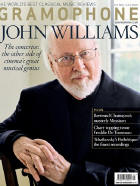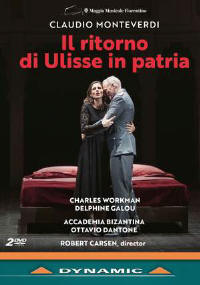Texte paru dans: / Appeared in: |
|
 |
Outil de traduction |
|
‘What God watches over the sleeping?’ asks Monteverdi’s Ulisse in his first outpouring. Here it’s the whole damn lot of them – aristocratic spectators in the theatre of human life.
In 2016 director Robert Carsen and conductor Ottavio Dantone joined forces for a staging of Monteverdi’s Orfeo in Lausanne. Last year they reunited in Florence for the composer’s Il ritorno d’Ulisse in patria at the city’s Maggio Musicale. With Covid restrictions still severe, the stalls of the Teatro della Pergola were stripped away, leaving just a handful of seats – a reminder not only of the extraordinary circumstances of the production but of life lived and music made in the face of larger, more powerful forces. Whether by accident or design, Carsen’s concept makes much of this moment. Mirroring the auditorium with its neat gilded boxes on the stage, placing Human Frailty (now a trio of singers, rather than a single figure) around the house itself, both embraces and implicates his viewers – playthings, all, of the Gods who sit splendid in red velvet throughout, looking down on the action below, on and off stage.
Luis Carvalho’s costumes designs give us Renaissance Gods, arranged by Carsen with all the care of an Old Master, and lit to that effect by Peter van Praet. The subtle play of shadows must have been spectacular in the theatre; on DVD it loses clarity, with too much of the detail and depth of the space lost in semi-obscurity.
The contemporary human world below is clearer: a non-specific space of conflict (Charles Workman’s Ulisse sports military fatigues) and luxury (Penelope’s palace is staffed by smart chambermaids, peopled with eurotrash suitors, pastel pullovers artfully slung over their expensively tailored shoulders). In Carsen’s hands their collision is bloodless – there’s no gore or even much grotesque here, even from John Daszak’s Iro – but far from unemotional.
This is thanks both to strong casting and Dantone’s impossibly rich, inventive orchestral realisation – sonic lighting that throws emphasis and casts shadow, guiding the ear as effectively as any designer. The contrast he achieves between the softly, freshly pastoral world of Eumete (Mark Milhofer, especially moving in his brief duet with Ulisse), with its musette-like haze of woodwind and strings, and the brash brilliance of the court is startling.
The cameos are deftly sketched: Hugo Hymas’s thrusting Eurimaco, resonant and passionate, Andrea Patucelli’s Antinoo (all swagger and throb), Guido Loconsolo’s inky Nettuno. But it’s Workman and his Penelope, Delphine Galou, who give Carsen’s understatement anchoring gravitas and feeling. There’s a nobility to Workman’s hero (no obvious trauma or rage here) that finds answer in Galou’s staunch queen, who can turn her contralto from sexless, countertenor coolness to sudden youth and warmth in an instant. The final scene is breathless in its musical reinventions: taking us from numbness to a rapturous, erotic ending in a thrilling tumble of musical action after so much suspension. |
|




